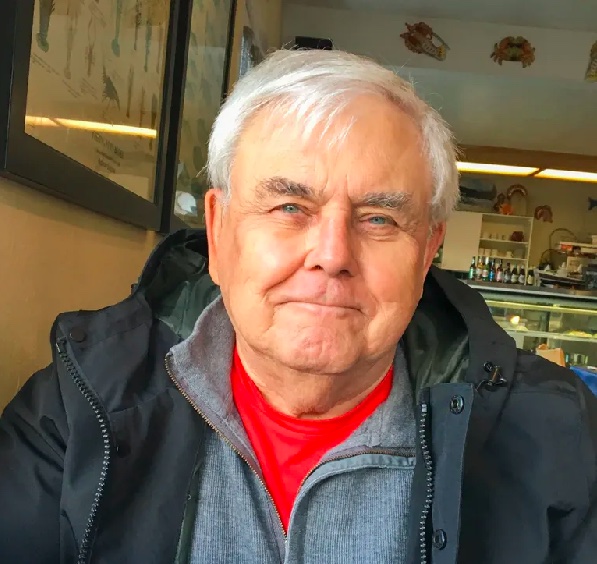forum
library
tutorial
contact

This Oregon Biologist Had an Outsized
Impact On Efforts to Save Salmon
by Lynda Mapes
Seattle Times, December 30, 2024
|
the film forum library tutorial contact |

|
This Oregon Biologist Had an Outsized
by Lynda Mapes
|
Early work included "Return to the River," a 2006 collaboration by multiple scientists that called for
rethinking management of the Columbia as a river, rather than industrial corridor.
 He left this life as he lived it, speaking truth about salmon.
He left this life as he lived it, speaking truth about salmon.
Biologist Jim Lichatowich died last April, just months before his newest book, "Managed Extinction," was published with co-author Rick Williams.
An independent biologist, Lichatowich of Columbia City, Ore., helped change the conversation about salmon in the region. His first earthquake in salmonland was a scientific paper published with his co-authors in 1991. "Pacific Salmon at the Crossroads" put the region on notice that the decline of wild salmon was not just a creek here, creek there problem, but a regional catastrophe, slaying salmon populations over a vast region of the Northwest.
Other early work included "Return to the River," a 2006 collaboration by multiple scientists that called for rethinking management of the Columbia as a river, rather than industrial corridor. Today the region is still in the midst of that conversation.
On Dec. 18, the U.S. Army Corps of Engineers and Bureau of Reclamation opened a new look at dam operations in the Columbia Basin, to take into account new information and changed conditions since approval of a 2020 environmental impact statement that today underlies river operations.
Amanda Goodin is a senior attorney at EarthJustice in Seattle, a firm advocating to boost salmon recovery in the basin. She sees an opportunity for a fresh look that takes account of new information, including a report issued by the National Oceanic and Atmospheric Administration in 2022 that stated recovery of Columbia Basin salmon at fishable levels of abundance will require removal of the four lower Snake River dams, in addition to other actions. Also to be accounted for is a report issued in June 2024 by the U.S. Department of Interior acknowledging the profound harm to tribes caused by the loss of salmon on the Columbia and Snake rivers, she noted.
It is yet unclear how the incoming Trump administration will influence this process.
It was Lichatowich who in his thinking defined the core of the problem as essentially a loss of faith in nature, which if allowed to function as only it can, takes care of the rest.
"He was just ferociously bright, and he had a capacity to think clearly and see through things," Dan Bottom, a retired NOAA research biologist said of Lichatowich, his friend and mentor. "Much of his career he spent talking about and delving into the conceptual basis for why we do things that had become ingrained in the profession, he could say, 'Why do we think that?' That led to a lot of conflict in his career, he was questioning things that had been accepted for generations and he brought to light a lot of things people were not even thinking about."
This latest book is the capstone in a trilogy by Lichatowich, beginning with "Salmon Without Rivers" (Island Press, 1999) followed by "Salmon People and Place" (OSU, 2013). "Managed Extinction" is magisterial in its sweep of history and biology; it penetrates to the roots of the assumptions and wishful thinking that underlie the salmon extinction crisis.
Salmon are dying from a loss of ecological companionship, Lichatowich and Williams explain, a phrase they coined to explain a fish asked to survive without its ecological context: the food they require, the forests, plants and animals with which they coexist, the form and function of the rivers that sustain them.
The annual return of the salmon was once an event that defined a region, the two note in their book, but today salmon streams are becoming impoverished and quiet, just stage props, the main player all but gone.
Confronting this could have been bitter and dispiriting, but working with Lichatowich was never like that, Williams said. The book is suffused with hope buoyed mainly by the miracle of the salmon themselves, powerful and resilient beings the two never lost their belief in, Williams said: "It had to remain optimistic, otherwise we are just kind of writing this doomsday book."
Paulette Lichatowich praised Williams for getting the book across the finish line, as her husband was weakened by cancer, dying at age 82, a shock in a man who had always been so strong and healthy, she said. A veteran who served four years in the Marines, he was her companion through 59 years of marriage and raising two sons together. She knew a sense of humor others might have missed, in a man who was a quiet, but forceful presence.
"He thought before he spoke," she said, "And when he would speak, people paid more attention to what he was saying."
learn more on topics covered in the film
see the video
read the script
learn the songs
discussion forum
